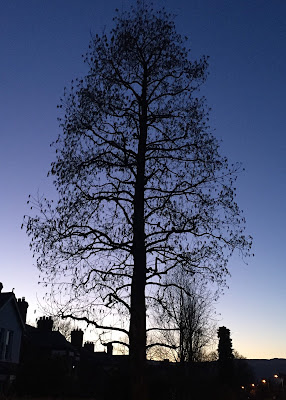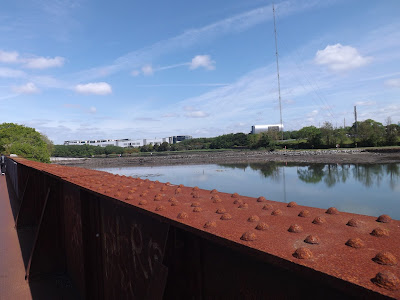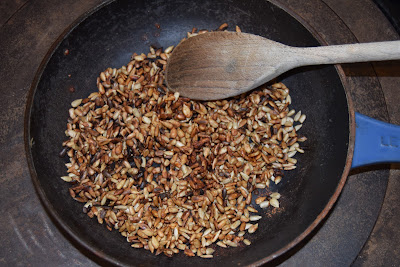72 / Serendipity
In an effort to halt the morphing of this blog site into a
hagiography, I’m supplying some further information about my involvement in the
area of community arts.
Repelled by the social/economic policies of Margaret
Thatcher’s government in the UK – including for N.Ireland – I decided to
make a visit to Belfast ‘to see for myself’. I had spent a number of years previously working at Great Georges Project, the Blackie, the innovative community arts and cultural centre
in Liverpool. As part of its
programme the Blackie successfully worked with the divided, fractious
communities of Liverpool 1 and Liverpool 8. I brought this knowledge of how art works in areas of inner
urban deprivation and strife to Belfast.
First volunteering on summer play schemes to get my bearings, I then
co-founded a community arts organisation with a small group of like-minded
volunteers from UK and N.Ireland.
The summer had been great craic and I'd met some good people, including my future wife.
Based in the University area of south Belfast, a largely
neutral area, we travelled out to east and west Belfast, and also to the
north of the city. We were involved
both in staunchly loyalist, unionist, as well as republican, nationalist
districts and accepted wherever we went.
People living in areas with a dearth of resources just as much as more advantaged
residents anywhere, value interesting, well-organised activities and events offered
free of charge to their children and the youngsters in their locality. We were, of course, acutely aware of
the dangers posed by ‘The Troubles’.
But only N.Irish people who were attracted to work with us and who already
were likely targets of the paramilitaries, were under threat. It was immensely sad to witness the
cruel and ruthless savagery which was a product of the bigoted sectarian divide.
Despite the Peace Process and signing of the Good Friday Agreement the divisions in the city remain. A few days ago I received an email message from on old
friend, in it she wrote, “There’s a new hate in Belfast , it’s against colour of
skin and change. There is a minority of people who just love to
hate and hurt.” I still
passionately believe in engaging people in the kinds of creative art activities and
events that we ran in Belfast is as vital and crucial as ever.
It seems my niece is following similar thought processes to my own. My postgrad training was as a secondary teacher, but I had no real desire to teach in a formal, school setting. My niece has sent this contribution to my blog:
It seems my niece is following similar thought processes to my own. My postgrad training was as a secondary teacher, but I had no real desire to teach in a formal, school setting. My niece has sent this contribution to my blog:
“I certainly didn't set out to be a teacher; as a youngster I struggled with the rigidity of educational establishments. It appears to be in our blood though and in my 40's after a career working for the local authority with young people and their families (and a quick diversion in career by way of a PGCE!) I found myself standing, as a lecturer at my local tertiary college, in front of a diverse group of students. They were keen and highly motivated, some at the beginning of their path into helping others. I hoped to help them take their energy into creative intervention work though I did this alongside the familiar challenges of vital services for vulnerable people being squeezed and cut.
As part of their FdA Counseling Studies course we had been exploring Paolo Freire's 'Pedagogy of the Oppressed'. They had begun to make links with what they knew and express the kind of critical thoughts that make educators spark and glow inside.
One of them talked with enthusiasm about a London theatre project they had seen for people who were homeless. I opened a book that I had only had the chance to briefly scan before rushing to the lecture. I thought it seemed highly relevant. I read an excerpt to them about community art projects and play work - everyone seemed suitably on board, indicated approval of such schemes and acknowledged their merit in empowering individuals and drawing communities together.
Imagine my surprise and pride as I approached the next paragraph and read aloud about Mowbray Bates, described as a seminal figure, in developing approaches to bring disparate groups together through arts based projects in Belfast. That's my uncle, I told them with a broad smile. He was brave, said one student, an ex-soldier training in counseling to support people, like him, with Post-Traumatic Stress Disorder, it wasn't very safe over there for an Englishman in the 70's.
I agree, my uncle is brave and I admire him immensely for what he has achieved for others.”
While I thank my niece for her generous opinion, it strikes me as the view of someone on the outside looking in. Even in troubled times in Belfast, every day life continued. Civil society had not broken down. Judged on evidence seen on television news broadcasts circumstances can seem universally dire. But people find a way to get by - and so did we.
I agree, my uncle is brave and I admire him immensely for what he has achieved for others.”
While I thank my niece for her generous opinion, it strikes me as the view of someone on the outside looking in. Even in troubled times in Belfast, every day life continued. Civil society had not broken down. Judged on evidence seen on television news broadcasts circumstances can seem universally dire. But people find a way to get by - and so did we.
 |
| © Ann Brady, The Filigree Tree |

